Unit2知识点
Unit 2 知识点提要

8A Unit 2 知识点提要一、词汇1.广告可n. advertisement ▲(an/-s)2.英国的adj. British3.美国的adj. American4.饼干可n. <英> biscuit (a/-s)、<美> cookie (a/-s)5.卡车可n. <英>*lorry ▲(a/lorries)、<美> truck (a/-s)6.橡皮可n. <英> rubber (a/-s)、<美>eraser ▲(an/-s)7.足球可n. <英> football (a/-s)、<美> *soccer (a/-s)8.假期可n. <英> holiday (a/-s)、<美> vacation (a/-s)9.秋天可n. <英> autumn (a/-s)、<美> fall (a/-s)下落;跌倒;倒塌↓v. fall→三单:-s →▲过去式:fell →▲现分:-ing10.商店可n. <英> shop (a/-s)、<美> store (a/-s)11.院子可n. <英> garden (a/-s)、<美> y ard (a/-s)12.电影可n. <英> film (a/-s)、<美> movie (a/-s)[典型例题]( ) 1. People in the UK say biscuit while people in the USA say ______.A. cakeB.cookieC.eraserD.soccer( ) 2. Which sentence is likely (可能) to be spoken by Americans?A. David Beckham is a popular soccer star.B. The shop sells different kinds of biscuits.C. It doesn’t rain often in this city in autumn.D. The film is very popular.( ) 3. If you are an Englishman, you may say “__________ ”A.I want some cookies.B. Autumn is coming.C. Can I borrow your eraser?D. He often plays soccer with his friends.13.男女混合的,混合的adj. *mixed★一所混合学校a mixed school混合v.8AU4mix →▲三单:-es →过去式:-ed →现分:-ing把A与B混合mix A with B把...混合在一起8AU4mix ... together14.法语不可n. &法国人可n.(a/-s) &法国(人)的adj.8BU4French法国可n. France (a/-s) 常用单数15.外国的adj. foreign (not in or from your own country)外国人可n. foreigner (a/-s)16.语言可n. language (a/-s) (words used in speaking and writing)区分:青少年可n. *teenager (a/-s)17.在…期间prep. during18.讨论,议论v. discuss (talk about something)→▲三单:-es →过去式:-ed →现分:-ing★与某人讨论某事discuss sth. with sb.讨论可n.8BU5 discussion (a/-s)19.在课堂上(短语)in class20.<口>家伙可n. *guy (a/-s)21.<口>好朋友;搭档可n.*buddy ▲(a/buddies)22.主动提出,自愿给予v. offer (give something to someone)→三单:-s →过去式:-ed →现分:-ing★为某人提供某物(2种)offer sth. to sb.= offer sb. sth.★给某人某物(2种)give sth. to sb.= give sb. sth.23.结束v. end →三单:-s →过去式:-ed →现分:-ing终止;末尾;终点可n.7BU8end (a/-s)24.棒球可n. baseball (a/-s)25.赢得;赢,获胜v. win (be best or first in a competition)→三单:-s →▲过去式:won →▲现分:winning获胜者可n. winner (a/-s)26.最少的;最小的adj. (little的最高级) least27.至少,不少于(短语)at least28.至多,不超过(短语)at most29.较远(的)/更远(的) adj.&adv. (far的比较级) farther/further★further常考固搭(5种)进一步学习/研究further study/ research 进一步讨论further discussion更多的信息further information 其他的问题further questions再往前/下走8BU3further on/ down30.最远(的) adj.&adv. (far的最高级) farthest/furthest31.花费(时间或金钱) v. spend →三单:-s →▲过去式:spent →现分:-ing★★★★★“花费”公式(4种)It/事takes/took sb. 时间段to do sth.人spend(s)/spent时间段/金钱on sth.(in) doing sth.人pay(s)/paid(金钱)for sth.物cost(s)/cost sb. 金钱(A.takes; spendsB. takes; costsC. costs; costsD. spends; takes( )2. [基础题]The trip to the zoo _______ us about one hour by underground yesterday.A. paidB. tookC. spentD. cost( )3. [易错题]This dress is too expensive, it ____ me 2000 yuan.A.takesB. spendsC. paysD. costs( )4. [难题]He tries to spend as much time as he can ____ computer games.A. playB. playsC. playingD.to play32.制服可n. *uniform ★(a/-s)穿校服wear a school uniform= wear school uniforms33.国际象棋不可n. chess34.每日的,日常的adj.&日报n. daily35.每周的adj. weekly36.快的adj. quick 比较级:-er 最高级:the -est快地adv. quickly比较级:more ~ 最高级:the most ~慢的adj. slow 比较级:-er 最高级:the -est慢地adv. slowly比较级:more ~ 最高级:the most ~37.自始至终,从头到尾&(内部)穿过7BU6 prep. th r ough区分:though/although prep. 尽管thought v. 认为(think的过去式)38.浏览,快速查看(短语)look through39.真实的,真的adj. real真实地;确实,的确adv. really40.起初,首先(短语)at first41.继续/重复做某事(短语)keep (on) doing sth.[拓展] “继续做某事”(4种)keep (on) doing sth.= continue doing sth.= carry on doing sth. = carry on with sth.42.完成;结束v. finish →▲三单:-es →过去式:-ed →现分:-ing★完成做某事finish doing sth.43.午餐时间不可n. lunchtime★在午餐时间at lunchtime44.物理(学) 不可n. physicsPhysics _______ (be) a useful subject, the student must learn it wisely and well.45.羽毛球运动不可n. *badminton[总结] ★★★常考冠词题play+球类、棋、牌、中国乐器 e.g. play baseball/badminton/chess/cards/erhu(二胡) play the+西洋乐器 e.g. play the piano/violin/guitar/drums(鼓)46.理想的adj. *ideal★一所理想的学校an ideal school区分:想法,主意,思想可n. idea▲(an/-s)二、语言点1.(某人)为什么不做某事Why don’t/doesn’t/didn’t sb do sth. =why not do sth.2.like作动词意为“喜欢”,作介词意为“像”(无时态、人称、数的变化)be like 像;look like 看起来像像做某事be like doing sth.—What is your school life like?—It is like _______ (live) in a big garden.( ). Tom, _____ his brother, _____ playing basketball after school.A.like; likesB. like; likeC. likes; likesD. likes; like3.little “几乎没有”,修饰不可n. a little “有一些”,修饰不可n.few “几乎没有”,修饰可n.复 a few“有一些”,修饰可n.复4.你想要做某事吗?Would you like to do sth. ?肯定回答:Yes, I’d like/love to. 否定回答:I’d like/love to, but……5.做某事玩得开心have a good/great/nice/lovely/wonderful/fantastic time doing sth.有很多much/lots of/a lot of没有have no有更多时间做某事more time to do sth.有更少less有一段some time[典型例题]( )1. —Hey, guys. Do you often have a good time _____ after-school activities?—Of course, we do. And we always have a lot of time_____ soccer.A. to do; to practiseB. doing; to practiseC. to do; practisingD. doing; practising( )2.Amy had a lovely time ____ one place after another in Shanghai and she had much time _____ the city.A. to visit; to enjoyB. visiting; to enjoyC. to visit; enjoyingD. visiting; enjoying( )3.Linda had a great time ____ with her friends, and they also had some time ____ about their studies last weekend.A.to talk; to talkB. to talk; talkingC. talking; to talkD. talking; talking6.练习做某事practice doing sth.( )1. My brother enjoys __________ the piano in the music room.A.practice playingB. practice playC. practicing playingD. practice to play( )2. The two girls always have a good time ________ the piano together.A.practice to play B.to practice to play C.to practice playing D.practicing playing( )3. [难题]We should spend as much time as we can __________ English every day.A. practice speakingB. practice to speakC. on practicing speakingD. practicing speaking7.给某人买某物buy sth. for sb.= buy sb. sth.8.在几年级(2种)in Year/Grade+基数词= in the+序数词+year/gradee.g. 在八年级______________________= ______________________(思考:如果改用阿拉伯数字呢?)9.单个动名词作主语,谓语动词用单数As we all know, using public chopsticks ________ (be) necessary when we eat with others.10.“借”(3种)borrow/borrowed 借入borrow sth. from sb.从某人那借来某物lend/lent 借出lend sth. to sb.= lend sb. sth.把某物借给某人keep/kept 借用keep sth. for+时间段借用某物一段时间How long提问①(for)+时间段①since +时间点①since 从句How soon提问in +时间段How far提问路程①实际距离 e.g.500 metres①s’ walk/ ride /drive /flight(航行) /bus ride /car ride/ train ride①时间段+交通方式e.g. 15 minutes by bus How often提问频率①次数+a+时间单位 e.g. twice a week①every+时间单位 e.g. every day③频度副词7个:always总是、usually通常、often经常、sometimes有时、seldom很少、hardly几乎不、never从不( )1—How far is it from your home to your school? —________.A.On foot B.I can take a bus there C.It’s about half an hour D.About ten minutes’ walk( )2.— How long have you had the bike? — ______ two years. A.in B.until C.since D.for ( )3.— How soon will these waste bottles be recycled?—_________. I have called the recycling company. A.For an hour B.An hour ago C.After an hour D.In an hour( )4.—_________ do you go to the concert? — Always, because I’m interested in it.A.How longB. How soonC. How oftenD. How far( )5. —________ is it from here to your home town? — Well, it takes over three hours to get there by coach. A. How soon B. How much C. How long D. How far( )6.—________do you have after-school activities? —Twice a week.A.How long B.How far C.How often D.How soon( )7. [易错题]—________ do you hear from your parents a week? —At least twice a week.A. How many timesB. How soonC. How oftenD. How long12.一篇由一个美国男孩写的文章an article (written) by a boy from the USA13.the number of…“…的数量”作主语,谓V.用单数;a number of…“许多”作主语,谓V.用复数( ). —A number of volunteers ________ willing to teach in China’s rural areas(农村地区).—Yes, the number of them _______ getting ________.A. is; are; more and moreB. are; is; larger and largerC. is; is; bigger and biggerD. is; are; more and more14.提问数量的句型(2种)What’s the number of the students in your class?=How many students are there in your class?15.seem“似乎”用法(3种)①seem (to be)+adj. ②seem to do sth. ③It seems that+从句16.[难点]need作动词的2种用法若need是情态动词,need do sth. ; 若need是实义动词,need to do sth.解题关键:如何判断need是情态动词还是实义动词?法一:看三单__________________ 法二:看否定__________________ 法三:看提问__________________ ( )1. Millie ______ her homework at the moment.A. needs not finishB. doesn’t need finishC. need not to finishD. doesn’t need to finish( )2. You needn’t ______ those things if you ______ them.A.buy; needn’tB.to buy; don’t needC.buy; don’t needD.to buy; needn’t( )3. —Does he need ______ there at once ? —No, he ______ leave so hurriedly because he has enough time.A. to go; needB. go; needn’tC. to go; needn’tD.go; doesn’t need17.代词it/one(s)的区分:it同类且同物、one(s)同类不同物( ). —The black dress doesn’t look nice on me. I don’t like _____ at all. —How about the blue _____?A.one; one B.it; one C.it; it D.one; it18.Each of(√);every of(×)19.Each of us ________(have) a book. We each ________(have) a book.20.有一个星期的假期have a week off21.★对每科进行一次月考have a monthly test on each subject22.我的日常生活my daily life23.有很多时间参加课外活动have lots of time for after-school activities24.★有一小时的家庭作业have an hour of homework25.★进行一次学校旅行(2种)go on/for a school trip26.★停止做某事(同一件事)stop doing sth. 停下来去做某事(另一件事)stop to do sth. ( )1. We have worked so long. Let’s stop ______ a rest.A.have B.to having C.having D.to have( )2.My father told me a funny joke and I can’t stop ________ every time I think of it.A.to laugh B.laughing C.from laughing D.Laughmore+可n.复/不可n.+than 比…多less+不可n.+than 比…少fewer+可n.复+than 比…少the most+可n.复/不可n.最多the least+不可n.最少the fewest+可n.复最少。
英语九年级全一册Unit2知识点

英语九年级全一册Unit2知识点Unit2是英语九年级全一册系列中的一个单元,着重讲解了一些重要的语法知识和词汇。
在本文中,我们将就该单元的一些重要知识点进行详细介绍。
一、动词的过去分词形式在Unit2的学习中,我们需要掌握动词的过去分词形式,因为它们在完成时态、被动语态等语法结构中起到关键作用。
动词的过去分词形式通常是加上ed、d或了的。
例如:1. play——played(玩——玩过)2. watch——watched(看——看过)3. do——done(做——做过)值得注意的是,也有些动词的过去分词形式要变化,需要特别记忆。
例如:1. go——gone(去——去过)2. eat——eaten(吃——吃过)二、目的状语从句Unit2中还介绍了目的状语从句的用法。
目的状语从句用来表示目的或意图,通常由连接词"so that"或"in order that"引导。
例如:1. He studies hard so that he can get good grades.(他努力学习,以便能取得好成绩。
)2. They saved money in order that they could go on a trip.(他们存钱以便能去旅行。
)目的状语从句在句子中起到修饰作用,使句子意思更加明确。
三、情态动词Unit2还介绍了一些情态动词的用法,如can、could、may、might、shall、should、will、would等。
情态动词在句子中表示说话人的意愿、推测、建议、允诺等情态。
例如:1. You should study hard for the exam.(你应该为考试努力学习。
)2. They may go to the park tomorrow.(他们可能明天去公园。
)情态动词在句子中的具体用法需要根据具体语境来理解和掌握。
四、描写性形容词和描写性副词在Unit2的学习中,我们还需要掌握描写性形容词和描写性副词的用法。
七年级unit2重要知识点
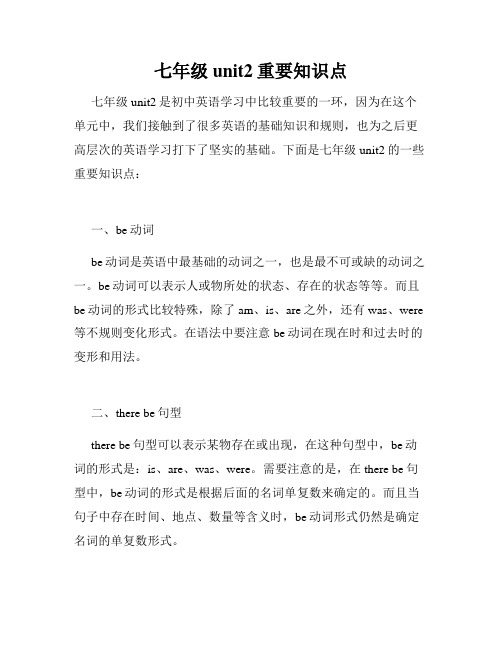
七年级unit2重要知识点七年级unit2是初中英语学习中比较重要的一环,因为在这个单元中,我们接触到了很多英语的基础知识和规则,也为之后更高层次的英语学习打下了坚实的基础。
下面是七年级unit2的一些重要知识点:一、be动词be动词是英语中最基础的动词之一,也是最不可或缺的动词之一。
be动词可以表示人或物所处的状态、存在的状态等等。
而且be动词的形式比较特殊,除了am、is、are之外,还有was、were 等不规则变化形式。
在语法中要注意be动词在现在时和过去时的变形和用法。
二、there be句型there be句型可以表示某物存在或出现,在这种句型中,be动词的形式是:is、are、was、were。
需要注意的是,在there be句型中,be动词的形式是根据后面的名词单复数来确定的。
而且当句子中存在时间、地点、数量等含义时,be动词形式仍然是确定名词的单复数形式。
三、形容词和副词形容词和副词是英语中比较重要的词性之一,它们可以对名词或者动词的程度或性质进行修饰。
在形容词和副词的用法中,需要注意形容词和副词的位置和常见的不规则形式等等问题。
四、名词和名词性物主代词名词是英语中最基础和最常见的词性之一,也是我们日常交流中最常使用的词性之一。
而名词性物主代词则可以代替名词,表示某个人、物、事物的所有权。
需要注意的是,名词性物主代词的形式是固定的,常见的形式是my、your、his、her、its、our、their等。
五、数字和单位数字和单位是我们在交流中必须使用的词汇之一,也是我们学习英语时必须会的词汇之一。
在数字和单位中,需要注意数字的读法和常见的度量单位等等问题。
此外,在进行口语表达时,还要注意习惯用语和地区差异等问题。
六、交际用语交际用语是我们在交流中必须使用的句子或表达方式,它们可以让我们更好的表达意思,更好地和人沟通。
在交际用语中,常见的说话方式包括问候、道歉、感谢、请求、建议等等。
Unit 2单元复习知识点 人教新目标英语七年级上册
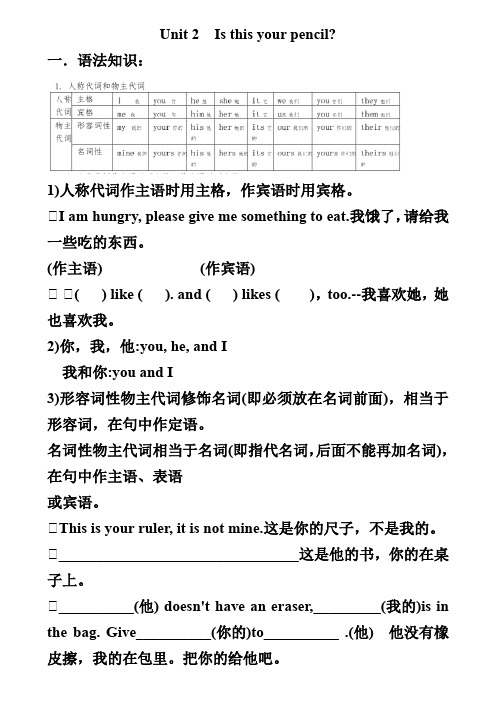
Unit 2 Is this your pencil?一.语法知识:1)人称代词作主语时用主格,作宾语时用宾格。
①I am hungry, please give me something to eat.我饿了,请给我一些吃的东西。
(作主语) (作宾语)① ①( ) like ( ). and ( ) likes ( ),too.--我喜欢她,她也喜欢我。
2)你,我,他:you, he, and I我和你:you and I3)形容词性物主代词修饰名词(即必须放在名词前面),相当于形容词,在句中作定语。
名词性物主代词相当于名词(即指代名词,后面不能再加名词),在句中作主语、表语或宾语。
①This is your ruler, it is not mine.这是你的尺子,不是我的。
①________________________________这是他的书,你的在桌子上。
①__________(他) doesn't have an eraser,_________(我的)is in the bag. Give__________(你的)to__________ .(他) 他没有橡皮擦,我的在包里。
把你的给他吧。
2.Is this/that..,?这/那是...... 吗?Yes, it is. / No, it isn’t.是的,这/那(它)是。
/不,这/那(它)不是。
①回答时,要用it来代替this和that。
Is this/that your ruler? Yes, it is. /No, it isn’t.不可回答Yes, this/that is, / No, this/that isn't.3. Excuse me.请原谅/打扰了(客套语,用于问别人问题、请别人帮忙、打断别人说话等场合。
)Sorry/I’m sorry.“对不起,抱歉”(用于向别人表示歉意)A: Excuse me. Where is my pen?打扰了,我的钢笔在那?B: Sorry/I'm sorry. I don’t know.对不起,我不知道。
仁爱版八年级上册unit2知识点
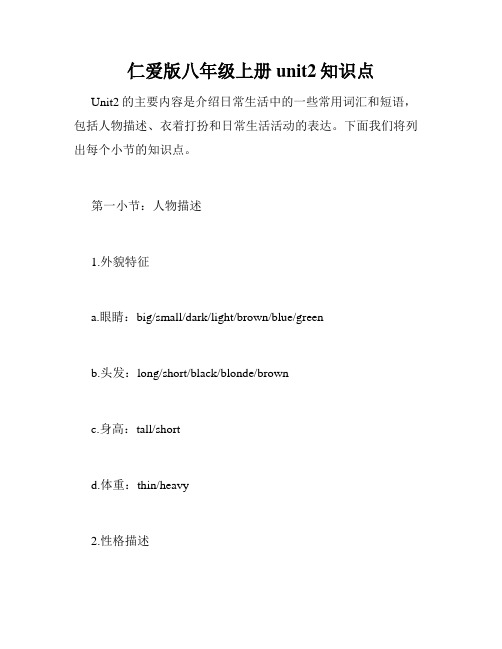
仁爱版八年级上册unit2知识点Unit2的主要内容是介绍日常生活中的一些常用词汇和短语,包括人物描述、衣着打扮和日常生活活动的表达。
下面我们将列出每个小节的知识点。
第一小节:人物描述
1.外貌特征
a.眼睛:big/small/dark/light/brown/blue/green
b.头发:long/short/black/blonde/brown
c.身高:tall/short
d.体重:thin/heavy
2.性格描述
a.开朗:outgoing/friendly
b.安静:quiet/shy
c.勇敢:brave
d.有礼貌:polite
第二小节:衣着打扮
1.上衣:T-shirt/sweater/shirt/blouse
2.裤子:jeans/pants/shorts
3.鞋子:sneakers/sandals/boots
4.配饰:necklace/bracelet/watch/earrings 第三小节:日常活动表达
1. 问路:Excuse me, can you tell me the way to...?
2. 看病:I feel sick. I need to see a doctor.
3. 看电影:Would you like to go to the movies with me?
4. 离开:Goodbye. Have a nice day.
本节重点:
1.掌握常用词汇和短语。
2.熟练应用词汇和短语,能够写出相关的句子和话题。
3.通过看图、听音等多种方式让学生掌握所学内容。
通过本节学习,学生可以扩展自己的词汇量和日常表达能力,从而达到更好的交流效果。
unit 2知识点
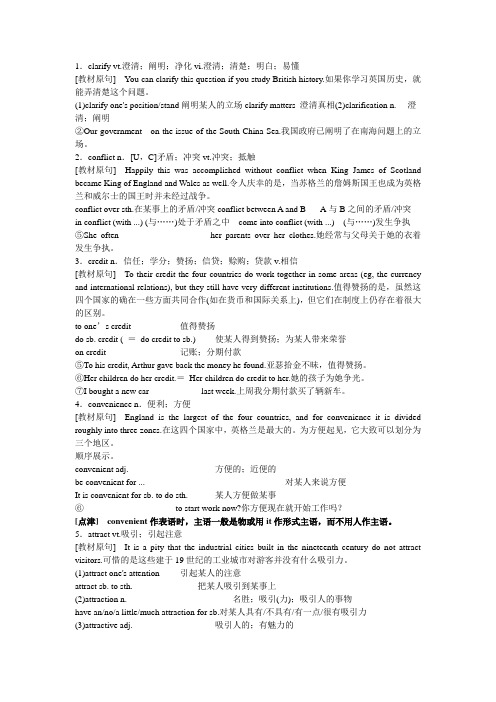
1.clarify vt.澄清;阐明;净化vi.澄清;清楚;明白;易懂[教材原句]You can clarify this question if you study British history.如果你学习英国历史,就能弄清楚这个问题。
(1)clarify one's position/stand阐明某人的立场clarify matters 澄清真相(2)clarification n. 澄清;阐明②Our government on the issue of the South China Sea.我国政府已阐明了在南海问题上的立场。
2.conflict n.[U,C]矛盾;冲突vt.冲突;抵触[教材原句]Happily this was accomplished without conflict when King James of Scotland became King of England and Wales as well.令人庆幸的是,当苏格兰的詹姆斯国王也成为英格兰和威尔士的国王时并未经过战争。
conflict over sth.在某事上的矛盾/冲突conflict between A and B A与B之间的矛盾/冲突in conflict (with ...) (与……)处于矛盾之中come into conflict (with ...) (与……)发生争执⑤She often her parents over her clothes.她经常与父母关于她的衣着发生争执。
3.credit n.信任;学分;赞扬;信贷;赊购;贷款v.相信[教材原句]To their credit the four countries do work together in some areas (eg, the currency and international relations), but they still have very different institutions.值得赞扬的是,虽然这四个国家的确在一些方面共同合作(如在货币和国际关系上),但它们在制度上仍存在着很大的区别。
四年级上册英语unit 2 知识点归纳

Unit 2 Our holidays一. 重点单词1.photo 照片2. song 歌曲3.year 年4.poem 诗歌5.soon不久7.tomorrow 明天8.then 然后二.重点词组1. have a look 看一下2. National Day 国庆节3. on Mother’s Day 在母亲节4. Father’s Day 父亲节5. Teacher’s Day/ Teachers’ Day 教师节6. Children’s Day 儿童节7. Christmas Day 圣诞节8. make a card 做卡片9. Tian’anmen Square 天安门广场10. draw a picture 画画11. write soon 盼回信12. write a poem 写一首诗13. sing a song 唱歌14.at the park在公园15.for lunch 午餐三.重点句子1. What are you doing? I am looking at Pat’s photos.你在干什么?我在看帕特的照片。
2. What’s Pat doing?She is writing a poem for Teacher’s Day.帕特在干什么?她在为教师节写一首诗。
3. What’s Pat doing?She’s drawing a picture for Natio nal Day.帕特在干什么?她正在为国庆节画画。
4. What’s Pat doing?She’s singing a song for Children’s Day.帕特在干什么?她正在为儿童节唱歌。
5. What’s Pat doing?She’s making a card for Christmas Day.帕特在干什么?她正在为圣诞节写卡片。
6.Do you like my poem? Yes, I do.你喜欢我的诗吗?是的7.When’s Father’s Day? It’s on June 15 this year.父亲节是什么时候?今年是在6月15日。
英语1(基础模块)第2版--unit-2-知识点及练习
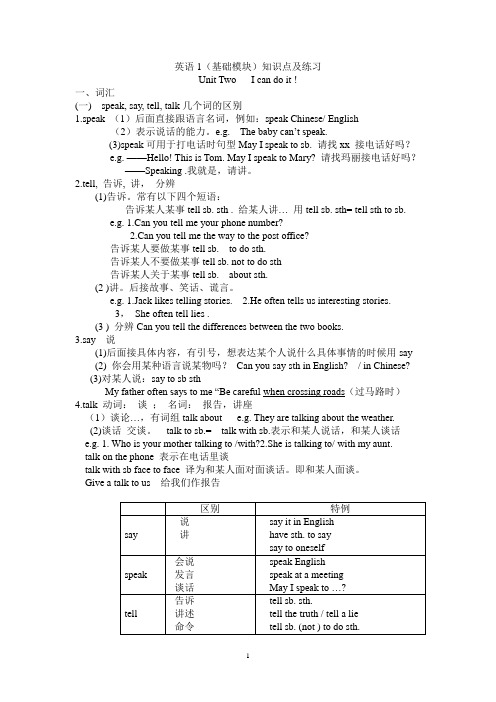
英语1(基础模块)知识点及练习Unit Two I can do it !一、词汇(一) speak, say, tell, talk几个词的区别1.speak (1)后面直接跟语言名词,例如:speak Chinese/ English(2)表示说话的能力。
e.g. The baby can’t speak.(3)speak可用于打电话时句型May I speak to sb. 请找xx 接电话好吗?e.g. ——Hello! This is Tom. May I speak to Mary? 请找玛丽接电话好吗?——Speaking .我就是,请讲。
2.tell, 告诉, 讲,分辨(1)告诉。
常有以下四个短语:告诉某人某事tell sb. sth . 给某人讲… 用tell sb. sth= tell sth to sb.e.g. 1.Can you tell me your phone number?2.Can you tell me the way to the post office?告诉某人要做某事tell sb. to do sth.告诉某人不要做某事tell sb. not to do sth告诉某人关于某事tell sb. about sth.(2 )讲。
后接故事、笑话、谎言。
e.g. 1.Jack likes telling stories. 2.He often tells us interesting stories.3,She often tell lies .(3 ) 分辨Can you tell the differences between the two books.3.say 说(1)后面接具体内容,有引号,想表达某个人说什么具体事情的时候用say(2) 你会用某种语言说某物吗?Can you say sth in English? / in Chinese?(3)对某人说:say to sb sthMy father often says to me “Be careful when crossing roads(过马路时)4.talk 动词:谈;名词:报告,讲座(1)谈论…,有词组talk about e.g. They are talking about the weather.(2)谈话交谈。
- 1、下载文档前请自行甄别文档内容的完整性,平台不提供额外的编辑、内容补充、找答案等附加服务。
- 2、"仅部分预览"的文档,不可在线预览部分如存在完整性等问题,可反馈申请退款(可完整预览的文档不适用该条件!)。
- 3、如文档侵犯您的权益,请联系客服反馈,我们会尽快为您处理(人工客服工作时间:9:00-18:30)。
Book4 Unit2 知识点Lesson91. grow into长成(grow---grew---grown)Eg. The boy has grown into a man.2. lend sb. sth=lend sth. to sb把…借给… (lend---lent---lent)Eg. He lent me his bike.= He lent his book to me.3. forget to do忘记干某事Eg. Don’t forget to bring your homework here tomorrow.4. cover …with…(强调动作) 用…覆盖…Eg. I cover the seed with soil 我用土覆盖住种子。
be covered with(强调状态) 覆盖着…Eg: The ground is covered with snow after snowing.下过雪之后,地面上覆盖着雪。
The desks are covered with dust/dirt. 课桌上覆盖着一层灰尘。
5.fill(v,充满,装满)---full(adj,满的;吃饱的)fill A with B(强调动作) 给A中装满B.Eg: Please fill the glass with water. 请给杯子里装满水。
be filled with = be full of (强调状态) 充满着…Eg: The basket is filled with eggs=The basket is full of eggs 篮子里装满着鸡蛋。
6. its(它的)---itself(它本身)Eg: A plant makes food in its leaves for itself. 植物在它的叶子里为它自身合成养分。
The film itself isn’t interesting, but the music is wonderful. 电影本身没意思,但音乐很美。
7. Would you please (not) do sth? 请(别)做某事好吗?Eg:Would you please lend me your green marker?Would you please not close the door?8. make a poster做海报Eg: Let’s make a poster and put it up (张贴)on the wall.Lesson101. bring… to…把…..带到Eg. Roots bring water from the ground to the plant..2. carry… to 把……运输到Eg:The stem carries water from the roots to the leaves and flowers.3. hold (v支撑) Eg: The stem holds the leaves and flowers in the sunlight.4.①feed sb/sth喂养…(feed---fed---fed)Eg. Have you fed your cat yet? 你喂过猫了吗?The seeds of the rice plant feed billions of people.水稻的种子养活了数十亿的人②feed on…以…为食Eg: Pandas feed on bamboo. Big pandas eat eighteen kilograms of bamboo every day.5. What is sth for …用来干什么?Eg. What is the tool for? 这个工具是干什么用的?Lesson11 Look After Your Plant1. look after ··· (well) = take(good) care of 好好照顾,照料…Eg. My sister is very young, but she can look after herself.2. You give it what it needs. what…译为“所…的.Eg: What he does makes me very sorry. 他所做的使我很痛心。
Don’t talk. I can’t hear what the teacher is saying clearly.别说话了,我听不清楚老师所讲的。
3. be made of/from 由…制作Eg: The wine is made from grapes.be made into …被制成Eg: Corn and wheat are made into wine.be made in …产于某地Eg: Where is it made? It’s made in Shanghai.4. cover(n盖子,封面)Eg: The covers are special boxes made of glass.Look at the book. How beautiful its cover!5.①keep sb. /sth. +adj.(形容词)表示“使某人或某物处于某种状态”Eg. Please keep the room clean and tidy. 情保持饭剪干净整洁。
②keep sth in sp 把某物保存在某处Eg: Some plants keep water in their stems. 有些植物把水保存在他们的茎里。
6.without 介词“没有“后跟名词,代词或动名词。
Eg. I can’t finish the work without your help.He passed me without saying anything.Lesson121. need to do 需要..做.. Eg. I need some paints to colour the picture.2. use… to do…用…做… Eg: Plants use water and sunlight to make food.3. everywhere=in every place=here and there= all around 到处4.pretty---prettier---the prettiest 漂亮的Eg:Lucy is the prettiest girl in her class.Lesson131.The reason why…“…的原因”Eg: Please tell me the reason why you didn’t do your homework.请告诉我你没做组偶尔的原因。
2. help do sth “帮着做某事Eg: Trees help clean the air.3. pleased(adj sb高兴的) ---pleasant(adj令人愉快的sth)Eg: The teacher is pleased with my work. 老师很满意我的作业。
I had a pleasant trip last summer. 去年夏天,我度过了一次愉快的旅行It’s pleasant to walk among the flowers. 在花丛中散步很令人愉悦。
4. sit under a tree in the shade 坐在在树荫下in the sunlight/ in the light 在阳光下/ 在灯光下5. carry …away …把…带走The wind and water can’t carry the soil away because of plants.由于植物,风和水不能带走土壤。
6.on the tree/on trees 在树上(生长的原有物) Eg:There are many apples on the tree.in the tree/in trees在树上(外来物) Eg:There are some bird singing in the tree.7. dig---dug---dug (v挖) Eg: They dug a hole big enough and planted a tree. Lesson14 短语1.in many ways .在很多方面Eg: People use plants in many ways .in many different ways .用很多不同的方法Eg: Plants and animals get their food in many different ways2. without a way to get energy, they would die.没有获得能量的方式,他们将会死亡。
3.half of 一半的Eg. Half of the world’s food comes from only three plants.Half of the grass is eaten by the sheep.4.make sth. from sth. 用某物做某事Eg. People make paper from grass .5. Do you have a hat made of straw? 稻草编织的帽子6. take the medicine three times a day 每天三次喝药People use medicine to help sick people. 人们用药帮助病人。
7.a piece(set) of furniture 一件(套)家具Lesson 15 知识点1.The seed (that)I planted has grown.我种的那粒种子(定语从句)Eg: This is the cage (that) Polly lives in.2.something new 形容词后置修饰不定代词Eg: Something new is growing at the top of the stem.Eg: I have something important to tell you. 我有些重要的事要告诉你。
3. turn …into变成,翻译成Eg: Water can turn into ice when the temperature is below zero.温度在零度以下时,谁可以变成冰。
